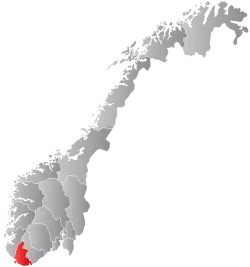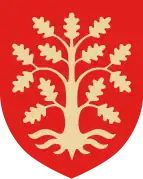Hidra Municipality
Hidra herred | |
|---|---|
| Hitterø herred (historic name) | |
 The village of Kirkehavn on Hidra | |
 Vest-Agder within Norway | |
 Hidra within Vest-Agder | |
| Coordinates: 58°13′15″N 06°34′45″E / 58.22083°N 6.57917°E | |
| Country | Norway |
| County | Vest-Agder |
| District | Lister |
| Established | 8 Oct 1893 |
| • Preceded by | Nes og Hitterø Municipality |
| Disestablished | 1 Jan 1965 |
| • Succeeded by | Flekkefjord Municipality |
| Administrative centre | Kirkehavn |
| Area (upon dissolution) | |
| • Total | 90 km2 (30 sq mi) |
| Population (1965) | |
| • Total | 1,277 |
| • Density | 14/km2 (37/sq mi) |
| Time zone | UTC+01:00 (CET) |
| • Summer (DST) | UTC+02:00 (CEST) |
| ISO 3166 code | NO-1042[1] |
Hidra is a former municipality that was located in the old Vest-Agder county in Norway. The 90-square-kilometre (35 sq mi) municipality existed from 1893 until its dissolution in 1965. It encompassed the islands and southern coastal part of the present-day municipality of Flekkefjord in what is now Agder county. The municipality included the islands of Hidra and Andabeløya as well as 56 other islands, plus the mainland coast from Abelsnes to the river Sira. The administrative centre was the village of Kirkehavn where Hidra Church is located.[2]
Hidra was home to Olav Omland (1909–1998), a landscape and coastal painter. He was also a poet and songwriter, and composed the song about Hidra "Hidrasangen". Hidra was also home to the eccentric personality and artist Tatjana Lars Kristian Guldbrandsen.
History
The parish of Nes og Hitterø was established as a municipality on 1 January 1838 (see formannskapsdistrikt law). However, on 8 October 1893, this municipality was split into two municipalities: Hitterø (population: 2,075) and Nes (population: 1,704). During the 1960s, there were many municipal mergers across Norway due to the work of the Schei Committee. On 1 January 1965, Hidra municipality (formerly called Hitterø) was merged with the municipalities of Nes, Gyland, most of Bakke, and the town of Flekkefjord to form the new municipality of Flekkefjord. Prior to the merger, Hidra had a population of 1,277.[3]
Name
The municipality (originally the parish) is named after the island of Hidra (Old Norse: Hitrar) since the first Hidra Church was built there. The name is the plural form of hitr which means "split" or "cleft" (referring to the fact that the island is almost split in two by the Rasvåg fjord).[2][4] Historically, the name of the municipality was spelled Hitterø. On 3 November 1917, a royal resolution changed the spelling of the name of the municipality to Hidra.[5]
Government
While it existed, this municipality was responsible for primary education (through 10th grade), outpatient health services, senior citizen services, unemployment, social services, zoning, economic development, and municipal roads. During its existence, this municipality was governed by a municipal council of directly elected representatives. The mayor was indirectly elected by a vote of the municipal council.[6]
Municipal council
The municipal council (Herredsstyre) of Hidra was made up of representatives that were elected to four year terms. The tables below show the historical composition of the council by political party.
| Party name (in Norwegian) | Number of representatives | |
|---|---|---|
| Labour Party (Arbeiderpartiet) | 2 | |
| Conservative Party (Høyre) | 2 | |
| Christian Democratic Party (Kristelig Folkeparti) | 3 | |
| Liberal Party (Venstre) | 6 | |
| Total number of members: | 13 | |
| Party name (in Norwegian) | Number of representatives | |
|---|---|---|
| Local List(s) (Lokale lister) | 13 | |
| Total number of members: | 13 | |
| Party name (in Norwegian) | Number of representatives | |
|---|---|---|
| Local List(s) (Lokale lister) | 12 | |
| Total number of members: | 12 | |
| Party name (in Norwegian) | Number of representatives | |
|---|---|---|
| Labour Party (Arbeiderpartiet) | 2 | |
| Local List(s) (Lokale lister) | 10 | |
| Total number of members: | 12 | |
| Party name (in Norwegian) | Number of representatives | |
|---|---|---|
| Local List(s) (Lokale lister) | 12 | |
| Total number of members: | 12 | |
| Party name (in Norwegian) | Number of representatives | |
|---|---|---|
| Labour Party (Arbeiderpartiet) | 2 | |
| Joint List(s) of Non-Socialist Parties (Borgerlige Felleslister) | 9 | |
| Local List(s) (Lokale lister) | 1 | |
| Total number of members: | 12 | |
| Note: Due to the German occupation of Norway during World War II, no elections were held for new municipal councils until after the war ended in 1945. | ||
See also
References
- ↑ Bolstad, Erik; Thorsnæs, Geir, eds. (26 January 2023). "Kommunenummer". Store norske leksikon (in Norwegian). Kunnskapsforlaget.
- 1 2 "Hidra". Store norske leksikon (in Norwegian). Retrieved 29 October 2009.
- ↑ Jukvam, Dag (1999). Historisk oversikt over endringer i kommune- og fylkesinndelingen (PDF) (in Norwegian). Statistisk sentralbyrå. ISBN 9788253746845.
- ↑ Rygh, Oluf (1912). Norske gaardnavne: Lister og Mandals amt (in Norwegian) (9 ed.). Kristiania, Norge: W. C. Fabritius & sønners bogtrikkeri. p. 303.
- ↑ "Norsk Lovtidende. 2den Afdeling. 1917. Samling af Love, Resolutioner m.m". Norsk Lovtidend (in Norwegian). Kristiania, Norge: Grøndahl og Søns Boktrykkeri: 1057–1065. 1917.
- ↑ Hansen, Tore; Vabo, Signy Irene, eds. (20 September 2022). "kommunestyre". Store norske leksikon (in Norwegian). Kunnskapsforlaget. Retrieved 3 August 2023.
- ↑ "Kommunevalgene og Ordførervalgene 1959" (PDF) (in Norwegian). Oslo: Statistisk sentralbyrå. 1960. Retrieved 21 November 2020.
- ↑ "Kommunevalgene og Ordførervalgene 1955" (PDF) (in Norwegian). Oslo: Statistisk sentralbyrå. 1957. Retrieved 21 November 2020.
- ↑ "Kommunevalgene og Ordførervalgene 1951" (PDF) (in Norwegian). Oslo: Statistisk sentralbyrå. 1952. Retrieved 21 November 2020.
- ↑ "Kommunevalgene og Ordførervalgene 1947" (PDF) (in Norwegian). Oslo: Statistisk sentralbyrå. 1948. Retrieved 21 November 2020.
- ↑ "Kommunevalgene og Ordførervalgene 1945" (PDF) (in Norwegian). Oslo: Statistisk sentralbyrå. 1947. Retrieved 21 November 2020.
- ↑ "Kommunevalgene og Ordførervalgene 1937" (PDF) (in Norwegian). Oslo: Statistisk sentralbyrå. 1938. Retrieved 21 November 2020.
